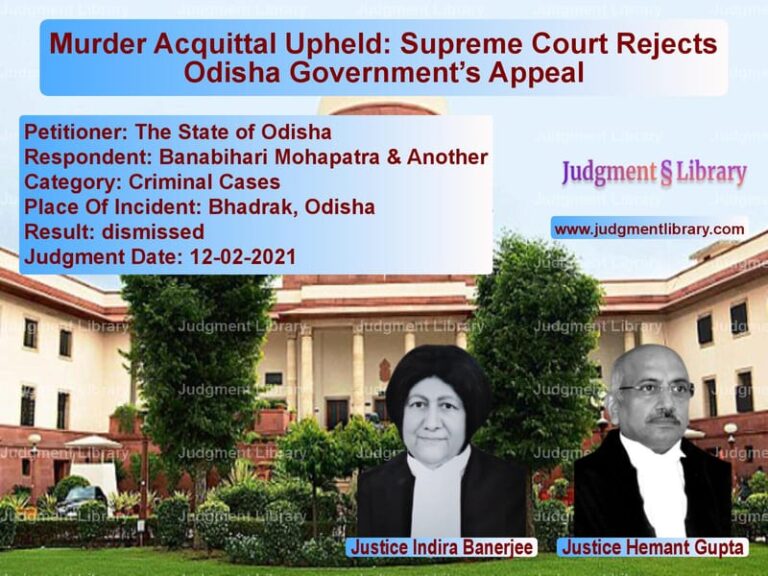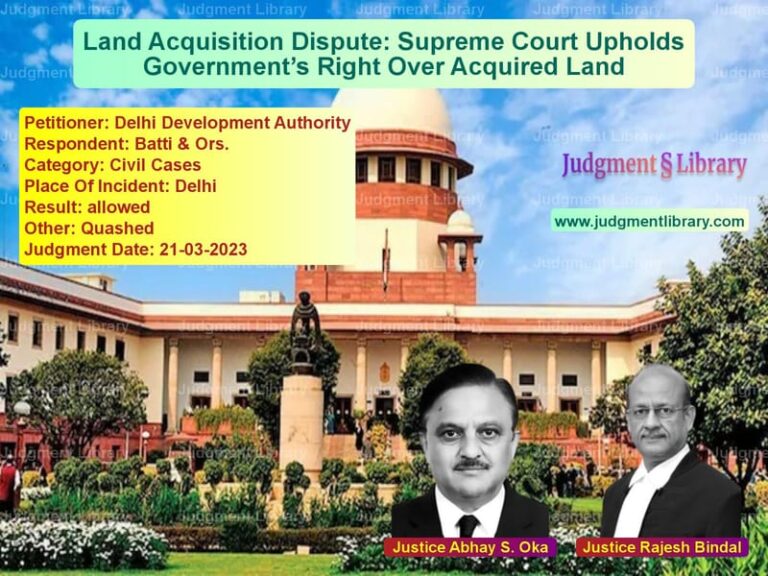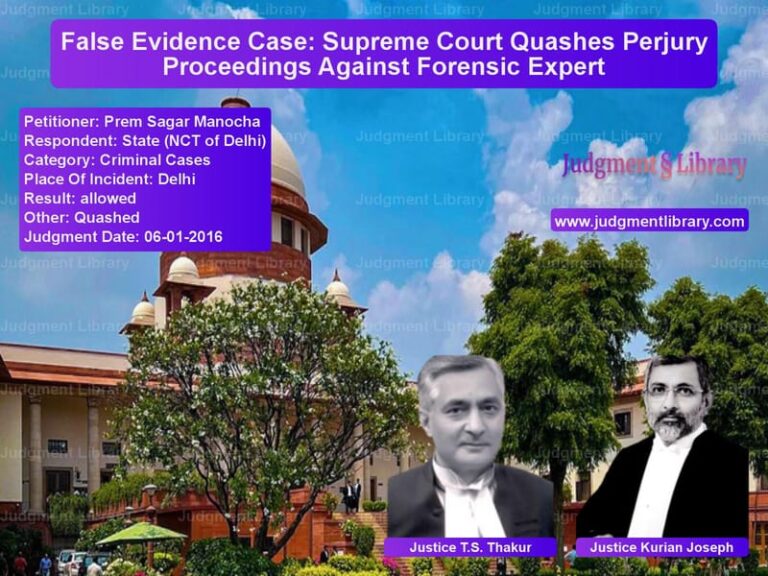SC Rules Foreign Arbitration Awards Cannot Be Challenged Under Section 34 of Arbitration Act
The Supreme Court of India has ruled that foreign arbitration awards cannot be challenged under Section 34 of the Arbitration and Conciliation Act, 1996 (hereafter ‘the Act’). The verdict came in the case of Noy Vallesina Engineering SpA (now Noy Ambiente S.p.a) vs. Jindal Drugs Limited & Ors., resolving a long-standing legal question regarding the applicability of Part I of the Act to foreign awards.
Background of the Case
The case involves a contract dispute between the appellant, Noy Vallesina Engineering SpA (an Italian company), and the respondent, Jindal Drugs Limited (an Indian company). In 1994, Jindal entered into multiple agreements with an engineering firm to set up an ascorbic acid plant in India. The engineering firm later assigned its obligations to Noy Vallesina, and disputes arose between the parties.
Jindal initiated arbitration proceedings under the rules of the International Chamber of Commerce (ICC), Paris. The arbitral tribunal dismissed Jindal’s claims and instead awarded damages to Noy Vallesina. Jindal challenged the partial award under Section 34 of the Act before the Bombay High Court.
Arguments by the Petitioner (Noy Vallesina Engineering SpA)
Noy Vallesina contended that:
- Under Part II of the Act, which governs foreign awards, Indian courts have no jurisdiction to set aside a foreign award.
- The agreement provided that arbitration would take place in London under ICC rules, and as such, UK law governed the arbitration.
- Since the arbitration was conducted outside India, only UK courts had jurisdiction over any challenge to the award.
- The Bombay High Court wrongly allowed a challenge under Section 34, which applies only to domestic arbitrations.
Arguments by the Respondent (Jindal Drugs Limited)
Jindal argued that:
- Since the contract stated that Indian law would govern disputes, Section 34 of the Act should apply.
- The rulings in Bhatia International v. Bulk Trading S.A. and Venture Global Engineering v. Satyam Computer Services Ltd. allowed challenges to foreign awards under Section 34.
- The agreement’s reference to UK arbitration law did not mean that Indian courts could not review the award.
- The Bombay High Court correctly decided that a foreign award could be challenged under Section 34.
Supreme Court’s Observations
The Supreme Court rejected Jindal’s arguments and made the following key observations:
1. Foreign Awards Governed by Part II of the Act
The Court ruled that the Arbitration Act, 1996 follows the territorial principle, meaning that arbitration proceedings conducted outside India are not subject to Indian judicial intervention under Part I.
“Part I applies only to arbitrations having their seat in India. Therefore, the provision that the Act would govern arbitration proceedings does not mean that Indian courts can set aside an award made outside India.”
2. BALCO Judgment Overruled Prior Precedents
The Court cited the Constitution Bench decision in Bharat Aluminium Co. v. Kaiser Aluminium Technical Services Inc. (BALCO), which clarified that:
“Foreign arbitration awards are not subject to challenge under Section 34 of the Act, and enforcement of such awards is governed by Part II.”
The Court further noted that pre-BALCO rulings in Bhatia International and Venture Global were incorrect and had been overruled.
3. Seat of Arbitration Determines Jurisdiction
The Court reaffirmed that the seat of arbitration is the deciding factor for determining jurisdiction.
“The choice of a foreign seat of arbitration automatically excludes the application of Part I of the Act and vests jurisdiction in the courts of the seat country.”
Since the arbitration was held in London under ICC rules, UK law governed the arbitration proceedings.
4. Enforcement and Challenge are Separate Processes
The Court clarified that challenging an award and enforcing it are two separate legal processes. While enforcement of foreign awards in India is governed by Section 48 of the Act, any challenge to the award must be pursued in the jurisdiction of the seat of arbitration.
“The remedy of setting aside an award is different from resisting enforcement. The only grounds for refusing enforcement of a foreign award in India are those mentioned in Section 48.”
Final Judgment
The Supreme Court ruled:
- The Bombay High Court erred in holding that Section 34 applies to foreign awards.
- The challenge to the arbitration award was not maintainable in India.
- Foreign awards can only be resisted under Section 48, not annulled under Section 34.
- The appeal by Noy Vallesina Engineering SpA was allowed, and the High Court’s ruling was set aside.
Conclusion
This judgment reinforces India’s adherence to the territorial principle in arbitration law and clarifies that foreign arbitration awards cannot be challenged in Indian courts under Section 34. It upholds party autonomy in choosing arbitration jurisdictions and strengthens India’s commitment to international arbitration norms. The ruling is a significant step in making India a more arbitration-friendly jurisdiction and ensuring legal certainty in cross-border disputes.
Petitioner Name: Noy Vallesina Engineering SpA.Respondent Name: Jindal Drugs Limited & Ors..Judgment By: Justice S. Ravindra Bhat, Justice Indira Banerjee.Place Of Incident: London, United Kingdom.Judgment Date: 26-11-2020.
Don’t miss out on the full details! Download the complete judgment in PDF format below and gain valuable insights instantly!
Download Judgment: Noy Vallesina Engine vs Jindal Drugs Limited Supreme Court of India Judgment Dated 26-11-2020.pdf
Direct Downlaod Judgment: Direct downlaod this Judgment
See all petitions in Arbitration Awards
See all petitions in International Arbitration
See all petitions in Enforcement of Awards
See all petitions in Judgment by S Ravindra Bhat
See all petitions in Judgment by Indira Banerjee
See all petitions in allowed
See all petitions in Quashed
See all petitions in supreme court of India judgments November 2020
See all petitions in 2020 judgments
See all posts in Arbitration and Alternate Dispute Resolution Category
See all allowed petitions in Arbitration and Alternate Dispute Resolution Category
See all Dismissed petitions in Arbitration and Alternate Dispute Resolution Category
See all partially allowed petitions in Arbitration and Alternate Dispute Resolution Category







